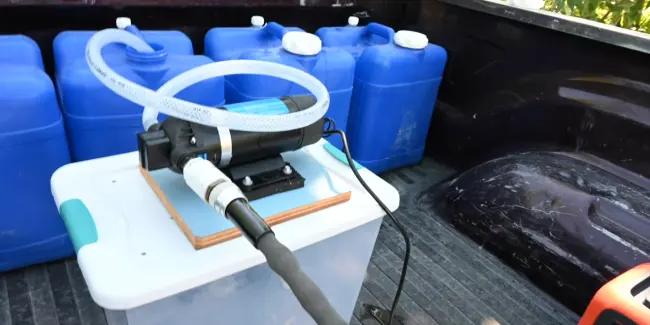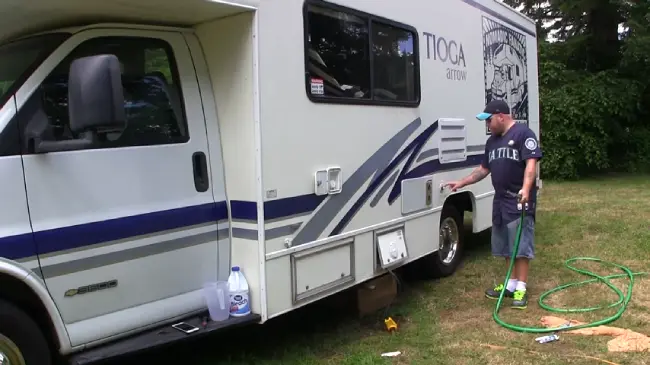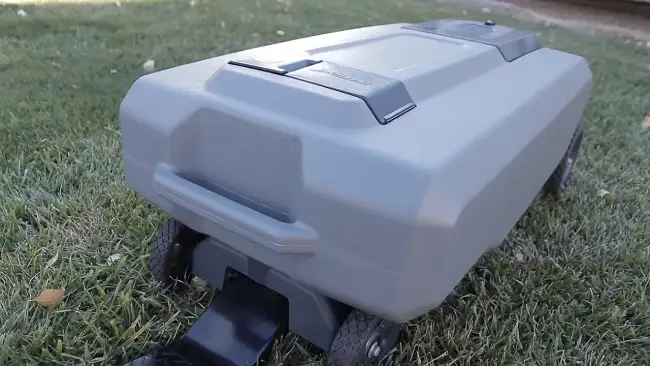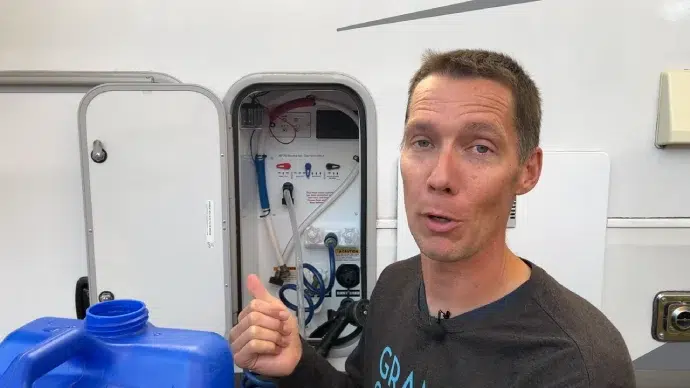Last Updated on December 24, 2023
Are you planning a road trip in your RV and wondering how long your 30-gallon water tank will last? To avoid running out of water in the middle of your journey, you should know how much water you can use daily.
With a water capacity of 30 gallons and an average usage of 5 gallons per person daily, a water tank will last 5-6 days for two people using the trailer. However, the water will last even less if there are more occupants.
On average, a person uses about 1 to 2 gallons of water daily for drinking and cooking. But if you plan to shower in your RV, use more water. Depending on how much water you use daily, you can estimate how long your 30-gallon tank will last and plan accordingly.
Check out the rest of the article for more info.
How Many Gallons of Water Does Each Person Use for Showering in the RV?

On average, a person uses around 2 to 5 gallons of water per shower while dry camping. But remember that this number can vary depending on the shower length and the water pressure.
To calculate how many gallons of water per person per day in your RV for showering, you should consider:
- The number of people in your group,
- How long each person typically showers, and
- The size of your gray tank.
If you have a 30-gallon tank and two people in your group, assuming each showers for five minutes, you could estimate that each person uses 2.5 gallons of water. This means each person can take around 12 showers before the tank is full.
Remember that the water pressure and the shower length can significantly affect how much water you use per shower. Also, other factors such as how often you wash dishes or do laundry, can impact your overall water consumption in your RV.
What Factors Affect Water Consumption in an RV?

When water consumption is in your RV, a few key factors can affect the water you use. These include:
#1 Number of Occupants
As you and your fellow travelers settle into your RV, consider how many people you have on board and their individual water needs. The number of occupants in your RV will greatly impact how much water you drink.
Generally, a single person will use significantly less water than a family of four. Consequently, the more people on board, the more water you’ll need to stock up on.
#2 Water Usage Habits
Now let’s look at your water usage habits and how they can affect your overall water consumption during your trip. Do you take long showers or shorter ones? Do you leave the faucet running while brushing your teeth or turn it off?
These may seem like small actions, but they can significantly impact water usage. Also, be mindful of how often you fill up your water tank.
Refill your tank only when necessary if camping near a water source. You can also invest in water-saving devices, such as low-flow showerheads and faucets, to help reduce your overall water usage.
How to Conserve Water in an RV?
If you’re looking to conserve water in your RV, you can take several practical steps:
#1 Install Low-Flow Fixtures:
By installing low-flow fixtures in your RV, you can effortlessly conserve precious resources and do your part for the environment.
These fixtures are designed to reduce water flow, so you can still enjoy a refreshing shower or easily wash your dishes. Plus, they’re easy to install and can save significant water over time.
When you install low-flow plumbing fixtures in your RV, you can save up to 50% of the water you normally use. This means you can make your water supply last longer and reduce the times you need to refill your water tank.
#2 Collect and Reuse Gray Water:
Collecting and reusing gray water is like putting money in a savings account for your water supply. This allows you to extend the life of your resources while reducing your environmental impact.
Using a collection bucket or tank under your RV’s sink or shower drain, you can easily collect gray water and wastewater from non-toilet sources for cleaning and watering. This helps you conserve water and reduces the strain on your RV’s holding tanks.
To make the most of your gray water, you can use it for activities that don’t require potable water, such as flushing your toilet or cleaning your RV’s exterior.
#3 Optimize Dishwashing:
Making dishwashing more efficient by minimizing water usage and using biodegradable and RV-safe products. Here are some tips to optimize dishwashing in your RV:
- Fill up a container or one side of the sink with soapy water and use minimal water for rinsing. This method saves a lot of water compared to continuously running the faucet while washing dishes.
- Consider using biodegradable and RV-safe dishwashing products to minimize water usage. These products are designed to work efficiently with less water and not harm the environment.
- Try to scrape off excess food from plates and utensils before washing them. This can significantly reduce the amount of water needed for dishwashing.
- Use a dish rack to air dry your dishes instead of a towel. This saves water and reduces the energy needed to dry your dishes.
#4 Use Water-Saving Appliances:
Switching to energy-efficient and water-saving appliances in your RV can help you reduce water usage and save money in the long run. Look for dishwashers and washing machines specifically designed for RVs that use less water per cycle.
These appliances can help you save up to 50% on your water usage, which is significant when living in an RV with a limited water supply. You can also consider upgrading your RV’s other appliances to energy-efficient models.
For example, you can replace your old water heater with a tankless one, which heats water on demand, saving you both space and energy. With these upgrades, you can enjoy the same convenience and comfort while using less water and energy.
#5 Practice Quick Showers:
Take speedy showers to save time and reduce your environmental impact, all while feeling refreshed and invigorated. A quick shower can be just as effective as a long one, and you can save a lot of water by reducing your shower time.
You can start by setting a timer or using a water-efficient showerhead to limit the amount of water you use. Turn off the water when soaping or shampooing, and keep your showers under five minutes.
You can reduce water consumption and save money on utility bills by taking fast showers. It’s also a great way to reduce your carbon footprint and make the world a better place.
#6 Collect Rainwater:
Collecting rainwater is an efficient and eco-friendly way to conserve resources and reduce environmental impact while living on the road. Installing a rainwater collection system on your RV can help you save money on water bills and reduce your reliance on municipal water sources.
Rain barrels or storage tanks can collect rainwater, which can then be used for various non-potable purposes such as cleaning or watering plants. Your RV needs gutters and downspouts to direct rainwater into your collection system so you can harvest rainwater effectively.
You can also use a mesh screen or filter to prevent debris from entering your collection system. With proper maintenance and regular cleaning, your rainwater collection system can provide you with an ample supply of water for your needs.
How long will 10 gallons of black water last in an RV?

Depending on how many people travel with you, ten gallons of black water can last 2-5 days. But, if you’re not careful with your water usage, it’s possible to run out of black water much sooner than anticipated.
You’ll need to adopt some water conservation habits to make the most out of your ten gallons of black water. Here are a few tips to help you extend the life of your black water tank:
- Use public restrooms whenever possible
- Take ‘military showers’ (turn off the water while lathering up)
- Use biodegradable toilet paper
- Consider installing a composting toilet
How long can I keep fresh water in my RV tank?
If you aren’t using the water and refilling, two weeks is the simple answer. But if you use all your fresh water and refill your tanks every week or two, there shouldn’t be any issues if you keep a clean tank.
What happens if you leave fresh water in the RV tank for too long? Bacteria can grow, causing a foul odor and taste. Also, minerals and other contaminants can build up in the tank over time, making drinking water unsafe.
Mastering Water Usage in RVs: Don’t Run Dry on the Road
Understanding how long water will last in your RV is crucial for not running out. With careful planning and conservation, you can stretch your water usage effectively and maximize your resources.
You now know how long 30 gallons of water will last in your RV and how to conserve water and make it last longer. Consider implementing the tips above to ensure your water supply lasts as long as possible.
But, you may still wonder, what if you have more people in your RV or we take longer showers? If that’s the case, you can always invest in a larger water tank or install a water-saving showerhead.
With the right tools and practices, you can make your water last longer and enjoy your RV adventures without worrying about running out of water. So, get out there and explore, but remember to conserve water.



